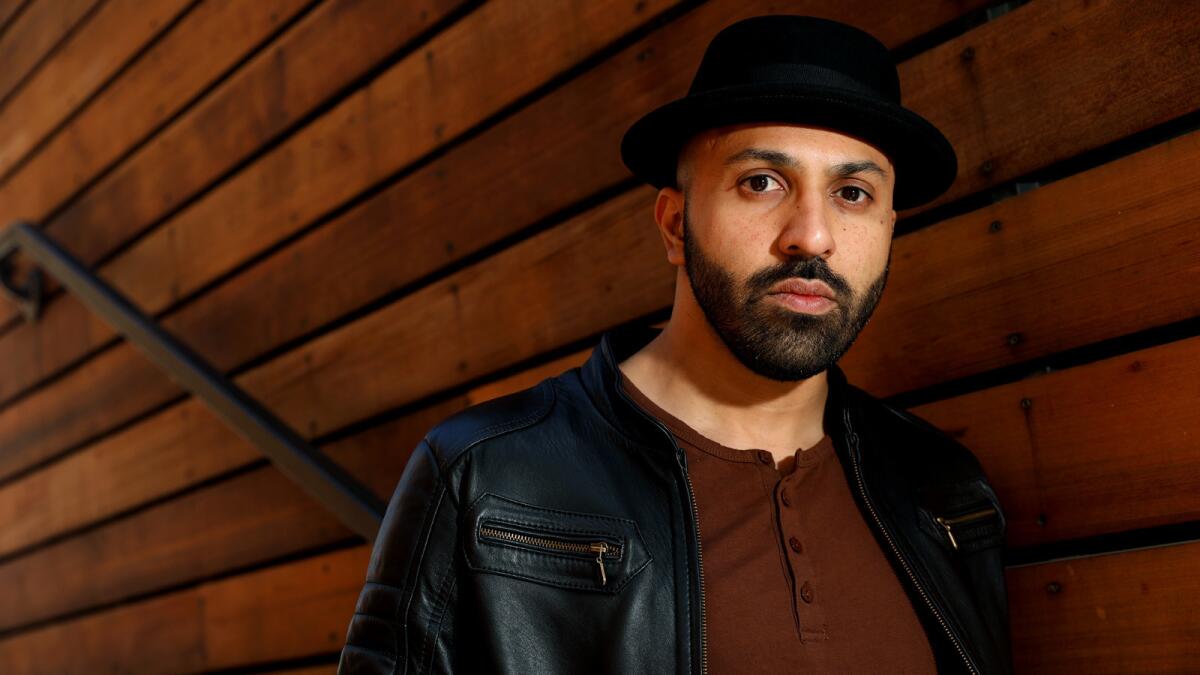‘Lunchbox’ director Ritesh Batra considers the nature of love in new film ‘Photograph’

- Share via
Growing up in Mumbai, filmmaker Ritesh Batra was struck by the number of Bollywood films that had rich girl-meets-poor boy as a central conceit.
“They would fall in love for no good reason,” said Batra. “There was a new version of that movie every month. Recently, I started thinking, ‘What if there was a way to do that that was real and organic, and you believe that two lives are crossing paths and finding corners of each others’ hearts that they wouldn’t have found if they hadn’t met each other?’ ”
The answer to that question is “Photograph,” Batra’s Hindi-language follow-up to his acclaimed 2013 film, “The Lunchbox,” his debut feature which collected a slew of awards on the festival circuit, became one of India’s highest grossing films overseas and a U.S. box-office hit in 2014. In that film, an alliance is formed between a lonely widower and a neglected housewife through a misdirected lunchbox delivery.
After “The Lunchbox,” Batra went on to direct the adaptations “The Sense of an Ending,” a mystery-drama starring Jim Broadbent and Charlotte Rampling, and “Our Souls at Night,” a romantic drama with Robert Redford and Jane Fonda.
But then Batra started to feel a longing to return to his roots.
“I was eager to get back to my own writing, and to directing my own writing,” the New York-based filmmaker said recently over lunch at a Mid-Wilshire hotel. “When you’re working with your own writing, you’re more intimately familiar with it. You can feel it in your bones. It’s easier to direct.”
“Photograph,” an Amazon Studios production opening May 17 in limited release, returns to the crowded streets of Mumbai where two people — whose lives would otherwise never intersect — find one another. Rafi (Nawazuddin Siddiqui, also in “The Lunchbox”) shares a slum dwelling with several other men and works as one of the hundreds of street photographers at the imposing Gateway of India. Passing by one day is Miloni (Sanya Malhotra), an accounting student who is the pride of her middle-class family, expected to graduate at the top of her class, find a husband and establish a respectable career. Rafi sells Miloni on the idea of snapping a quick pic. (“Years from now, when you look at this photo, you’ll feel the sun on your face. Here’s today in a photograph,” he eloquently touts to passersby.)
When Rafi’s grandmother (Farrukh Jaffar) continues pestering Rafi to find a wife, he sends her the photo of Miloni, claiming her to be his betrothed, in the hopes of silencing her. Instead, the elderly woman unexpectedly boards a train from her faraway village to meet Rafi’s intended — and somehow, a relationship is born.
“It seemed like a nice way to get them together without being heavy-handed about it,” said Batra of Rafi and Miloni. “Their paths would never have crossed. Their only conversation would be, ‘How much is it?’ and ’Here’s the change,’ and that would have been the end of the interaction.”
In casting Miloni, Batra said he was seeking someone who could portray a young woman “who doesn’t get to make her own decisions. Someone is always talking for her. She didn’t need a whole lot of lines. She had a lot going on inside, and we can see that her mind is always working.”
“I instantly felt a connection with Miloni,” said Malhotra via email. “There was a lot I could relate to. She’s reserved and introverted, She’s content living in her own world.”
Batra, who wrote the last scene of “Photograph” first, relies on small details to tell a story without a lot of fussy dialogue; a pair of antique silver anklets help unify a notion of the two different worlds Miloni finds herself straddling once Rafi enters her life. A friendship is quietly formed over tea at streetside chai stands, inside bustling sari markets and rundown movie theaters where rodents come with the territory.
“I just want audiences … to feel and realize the simplistic beauty of the film, and how two people can be connected with each other without a tag or against conventional societal norms,” said Malhotra.
Review: Charming ‘Photograph’ subtly connects lonely hearts in Mumbai »
Producer Anish Savjani said he had wanted to work with Batra after witnessing the filmmaker’s subtle mode of storytelling in “The Lunchbox.”
“That movie stayed with us for a while,” said Savjani. “We wanted to make sure a lot of the emotional scenes in ‘The Lunchbox’ were carried over to ‘Photograph.’ We like nuanced films with strong storytelling that doesn’t hit you over the head. It’s a universal story in a way and Mumbai is a central character in it.”
Siddiqui hung out with Mumbai street photographers to prepare for the part, wanting to portray the fundamental insecurities of that livelihood.
“They stand there throughout the day, regardless of the weather … it was very important to understand the change in their body language as the day passes by … to internalize their own crisis and insecurities.” Rafi, he said, is not the most articulate of characters, and tries to express himself in other ways.
Despite the inherent challenges of shooting in India, Batra said returning after working on American movies was “wonderful, especially to get the whole crew together again.”. “Photograph” was financed through pre-sales, which Batra said gave him a great deal of freedom — even with the expectations that come with having a breakout success as a debut.
“The work you’ve done before is a gift and it allows you to do your next work,” he said. “You can’t look behind.”
More to Read
Only good movies
Get the Indie Focus newsletter, Mark Olsen's weekly guide to the world of cinema.
You may occasionally receive promotional content from the Los Angeles Times.










